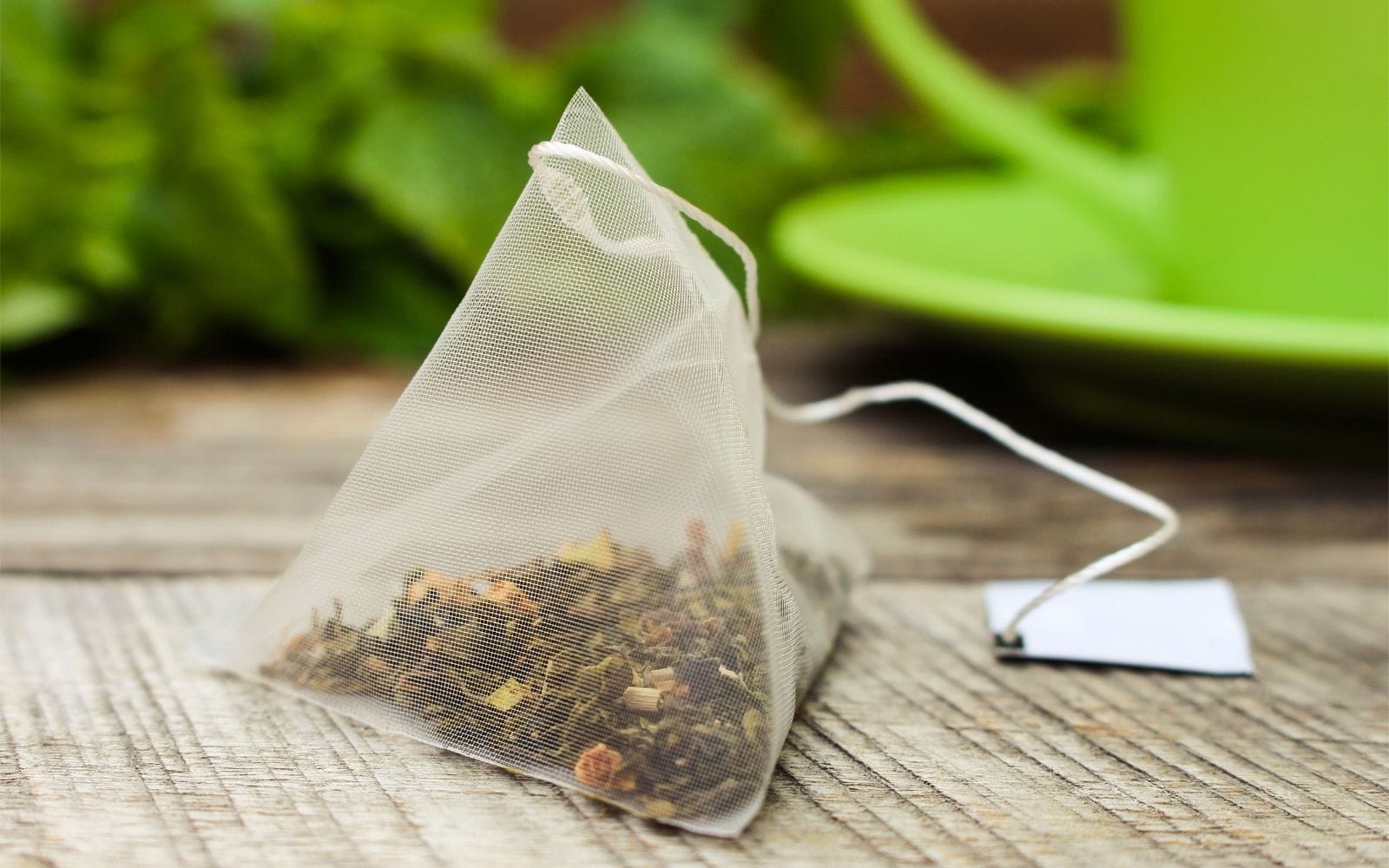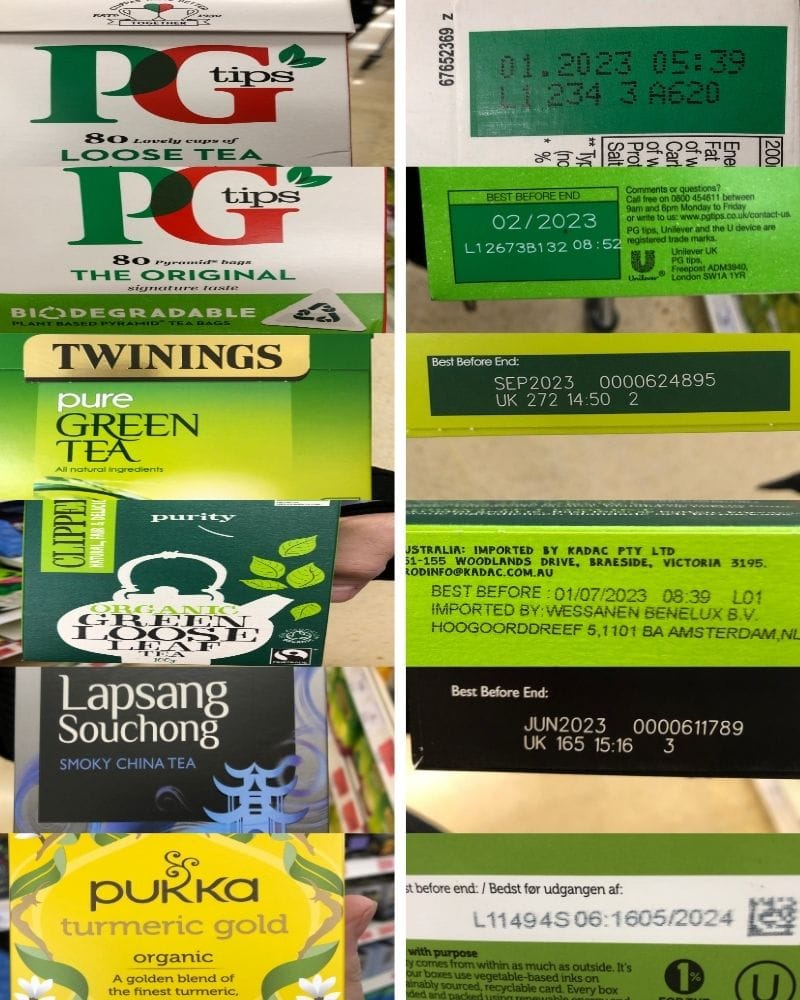Does Tea Expire And How Can You Tell

Disclosure: This post may contain affiliate links. If you click on a link we may make a small commission at no extra cost to you. You can read the full disclosure here
Does Tea Expire
With so many different types and flavors of tea to choose it’s easy to go overboard and end up buying way more than you actually need right now. Most packaged teas have a best before date but this date can generally be extended if tea is stored properly.
Can you use expired tea?
Tea leaves don’t tend to go bad if they are stored correctly. You can usually drink them well past their “Best Before” date. However, they will eventually deteriorate with age and go past their optimal quality. If you have tea leaves that are no longer drinkable, there are still plenty of uses for expired tea.
A “Best Before” date is a marker of quality rather than a safety issue. However, tea will inevitably deteriorate with age so the longer it sits, the less flavorful it will be. So if you’re trying to determine “does tea expire” it’s often your senses that are a more reliable guide to tell you if your tea has gone bad rather than any advocated timescale.
How Long Does Tea Last?

As a rough guide, packaged and loose leaf teas, when stored correctly, can often last 6-12 months past their “Best Before” date. It’s usually recommended that it’s consumed within 12 months although some suggest black tea can still be good for over 2-3yrs.
The more oxidized the tea type and the better the quality of the tea, the longer it will be tastier when stored properly. Generally, black and oolong teas last longer than green tea. The smaller leaves tend to lose freshness more quickly compared to that of the whole leaf; so loose leaf tea usually keeps fresher for longer too.
Examples Of UK Tea Types With Best Before Date
Here are some real-life examples of teas available in the UK, purchased in October 2021, with their manufacturers recommended best before dates.
| Tea Brand | Tea Type | Loose/Bag | Purchase Date | Best Before | Best Before Period |
|---|---|---|---|---|---|
| PG Tips | Black | Loose | October 2021 | January 2023 | 15 Months |
| PG Tips | Black | Bag (Pyramid) | October 2021 | February 2023 | 16 Months |
| Twinings | Green | Bag | October 2021 | September 2023 | 23 Months |
| Clippa | Green (Organic) | Loose | October 2021 | July 2023 | 21 Months |
| Twinings | Black | Bag | October 2021 | June 2023 | 20 Months |
| Pukka | Herbal | Bag | October 2021 | May 2024 | 31 Months |
Here are the images to evidence the data in the above table:

Tea leaves expire because of poor storage that leads to exposure or contamination to other elements. This is even more important for oolong and green tea leaves as they are more delicate. So in order to extend the longevity of your tea, you need to know how to store it.
Having said that, some years ago when I was still nursing and desperate for a brew on my break, a colleague kindly presented me with a welcome cup of mint green tea. However, I sipped initially with some trepidation as she announced that she had made it with tea bags that had been floating around her handbag for months or possibly years.
Surprisingly, despite its age and rough treatment, it still packed a flavorful punch and helped restore my focus for the remainder of my shift. Maybe I just got lucky!
How To Store Tea To Keep It Fresher For Longer
Storing tea correctly not only helps to maintain flavor and freshness but it helps to protect its wonderful aroma and antioxidant properties. Over time the chemical makeup of tea begins to change and it starts to lose its beneficial compounds. Not all tea types have the same substances or chemical structures so it’s difficult to determine how long these tea compounds last especially under all the different storage conditions.
- Keep tea away from direct sunlight, humidity, and damp places which will promote mold growth and slowly weaken the tea flavor.
- Store tea in sealed airtight containers, try using an opaque jar or tin
- Store tea at room temperature or in a cool dark place. Heat will accelerate chemical changes.
- Do not allow any airflow into the tea. If you are storing tea in pouches, seal the pouch and try not to open packaging unnecessarily. Pay special attention to green tea leaves as they will ruin much faster than black tea if left exposed to oxygen.
- Do not use wet spoons to scoop out tea leaves from their container.
- Store different flavor teas separately.
- If you plan on freezing simple tea leaves, make sure that you keep your tea in an air-tight container. Ensure there is no moisture or as little as possible inside of the container. You can freeze tea, whether it’s loose leaves, tea bags, or already brewed tea but you will lose a lot of flavors.
These SilverOnyx Tea Tin Canister’s are the exact ones I use to keep my tea perfectly fresh
As the “Best Before” date is more of an indicator of how long you can expect tea to remain flavorful, it’s impossible to accurately predict how long past the date the tea will still taste good, so how can we tell when it’s gone past its prime?
Sensing The Deterioration Of Your Tea

Smell
If the natural oils in the tea leaves have evaporated over time, their distinct aroma will be lost. You may even start to detect a pungent, musty odor with old, poorly stored tea. Fresh tea should be aromatic and brew up a flavorful cup.
Touch
Dried tea leaves may feel overly moist, crumble or even disintegrate despite careful handling. If they don’t feel smooth and sturdy it may be an indication that they are getting old.
Sight
The appearance of mold either in the tea container or evident on the actual tea leaves or bag. If your tea leaves have either darkened or changed color you may end up with a dull-looking brew.
Taste
If the tea’s natural fragrant aroma and flavor seem to be missing, it’s probably worth giving it a miss. It’s not going to make a tasty brew and may even have a chemical or stale taste.
The tea may not have actually become a health hazard but it’s probably not worth the effort or risk. Learn to trust your own senses when it comes to identifying any deterioration in your tea.
Top Tip: If there is still some flavor left in the tea but it has reduced, then just try using extra leaves or bags to your brew.
What Can You Do With Old Tea?
Here are just some great ideas you might like to consider to use up your old tea leaves or tea bags.
- If the tea is still good but is just starting to age then either send some to friends as a gift or simply invite them over to share a cuppa and a catch-up.
- Tea is so versatile it’s even lovely to bake with. The properties that make it great to brew also make it perfect to bake with. Try a tea loaf, made with fruit steeped in black tea, delicious.
- Tea leaves are great at absorbing odors, so use them to help remove smells such as fishy odors from your hands. Alternatively, thoroughly dry out old tea leaves or tea bags and put them into an open container. Place the container near the offending odor and simply let them absorb it! I like to use them in my fridge, they’re just a great natural odor neutralizer.
- Moistening tea bags with cold water is a great remedy for reducing puffy eyes, you can even try putting them in the fridge for a bit first. Apply for about 10-20 minutes and just relax. The tannins in tea have an anti-inflammatory effect.
- For a refreshing foot spa, or to reduce foot odor, steep tea bags in hot water. When the liquid has cooled down enough use it for a foot bath to soften the skin and reduce aches and pains. Green tea is especially good for this due to its antibacterial, antimicrobial, and anti-inflammatory properties. You could even place one or two tea bags in your bath water next time you take a soak. The antioxidants in the leaves will leave your skin feeling soft and super hydrated.
- Used tea leaves in compost will boost nitrogen levels and encourage decomposition.
- Some pot plants will benefit from having used tea leaves added to their soil.
These are some great ways to put your old tea leaves to good use. There’s a whole world of options out there so just get creative and please share your ideas.
Conclusion
The direct answer to the question does tea expire is yes, tea will deteriorate and eventually expire. So in order to make sure your tea continues to taste great for as long as possible, you need to make sure it’s stored correctly. Different types of tea will last for different periods of time however, most types of tea degrade in quality over time but it doesn’t really go bad without the presence of moisture and heat. In short, tea is often fine to drink long after the “Best Before” date you just may not experience the full flavor as it was intended.
Why Do Tea Leaves Expire?
Tea leaves expire because they are exposed to heat, water, light, or air. Storing them properly is the most important step to preserving the quality and shelf life of your tea.
Do Green Tea Leaves Expire?
Green tea comes with a “Best Before” date after which it will start to lose flavor and quality. It is a more delicate variety of tea so storing it correctly is vital to maintain its freshness and longevity.
How Do I Know My Tea Has Expired?
Notice how your tea looks, smells, and tastes. If the leaves have darkened or changed colour since you bought them, the distinct pleasant aroma is missing or the tea tastes stale or dull then it’s definitely past its best. If there is a particularly pungent smell or visible mold then it needs throwing away.







